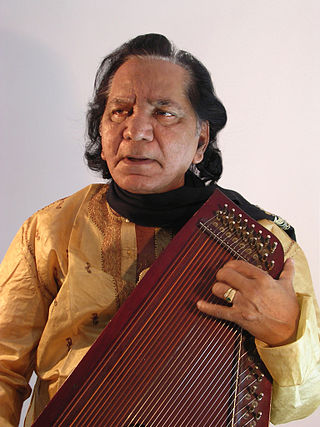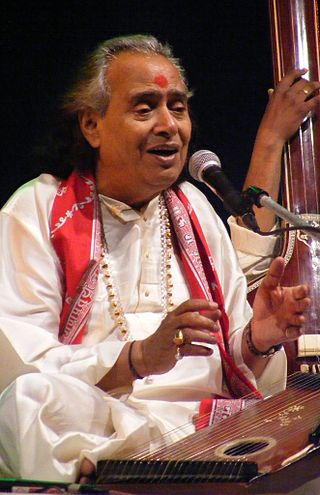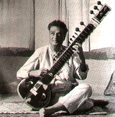Ramanlal C. Mehta was an Indian musician and musicologist. In 2009, he was awarded the Padma Bhushan, India's third-highest civilian honour.

Sunanda Nair is an Indian dancer trained in Mohiniattam. She did her master's degree in this dance form from Nalanda Nritya Kala Mahavidyalaya affiliated to the University of Mumbai. She has completed her PhD from University of Mumbai for her thesis "Intrinsic Lyrical Feminism in Mohiniattam". She was born in Mumbai, India.

Jagdish Prasad was a Calcutta-based Indian classical vocalist of the Patiala gharana.
The Agra gharana is a tradition of Hindustani classical vocal music descended from the Nauhar Bani. So far, Nauhar Bani has been traced back to around 1300 AD, during the reign of Emperor Allauddin Khilji of Delhi.

Pandit Ganapati Bhat, popularly known as Ganapati Bhat Hasanagi, is an Indian Hindustani classical vocalist. He belongs to Kirana -Gwalior Gharana. He is a resident guru at Dr. Gangubai Hangal Gurukul Trust in Hubli. He was born and brought up in Hasanagi, a small village in the state of Karnataka in India.

Pandit Chhannulal Mishra is a celebrated Hindustani classical singer from Banaras, a noted exponent of the Kirana gharana (school) of the Hindustani classical music and especially the Khayal and the 'Purab Ang' – Thumri.

Rajeev Taranath was an Indian classical musician who played the sarod. Taranath was a disciple of Ali Akbar Khan.
Khadim Hussain Khan was an Indian classical music singer born in Atrauli, United Provinces of Agra and Oudh, India.

Pandit Mani Prasad was an Indian classical vocalist from the Kirana gharana.

Jayashree R. Patanekar is a Hindustani classical vocalist. She has received training in Gwalior, Jaipur and Kirana gharana. She has received training from the great maestro Gajananrao Joshi.

Abdul Halim Jaffer Khan was an Indian sitar player. Khan received the national awards Padma Shri (1970) and Padma Bhushan (2006) and was awarded the Sangeet Natak Akademi Award for 1987.
Sanhita Nandi is a prominent Hindustani classical vocalist of the Kirana Gharana. The central motif of her style is slow tempo raga development and ornamented sargams. She is getting guidance under Mashkoor Ali Khan.

Pandit Vinayak Malharrao Torvi, is an Indian classical vocalist. He belongs to the Gwalior and Kirana gharanas.

Shanno Khurana is a noted Indian classical vocalist and composer, from the Rampur-Sahaswan gharana of Hindustani classical music. A disciple of the doyen of the gharana, Ustad Mushtaq Hussain Khan, she is known for performing rare bandish and raag, though her singing style includes genres like khayal, tarana, thumri, dadra, tappa, to chaiti and bhajan. Born and brought up in Jodhpur, she started singing on All India Radio in 1945 in Lahore, later shifted to Delhi, where she continued her singing on All India Radio, Delhi and in concerts and music festivals. She also pursued music education, finally earning her M.Phil. and PhD in music from the Kairagarh University, and has undertakes extensive research on folk music of Rajasthan.

Kamala Bose (Bengali) (1947–2012) was a prominent Indian classical vocalist.

Pandit Manilal Nag is an Indian classical sitar player and an exponent of the Bishnupur gharana of Bengal. He was given the Padma Shri Award, the fourth highest civilian award in India in 2020.

Maya Rao was an Indian classical dancer, choreographer and educator, in Kathak dance. She is known for her pioneering work in Kathak choreography, especially in dance ballets, and is credited for bringing Kathak, a North Indian-dance style to South India, when she opened her dance school, Natya Institute of Kathak and Choreography (NIKC) in Malleswaram, Bangalore in 1987. She was also the founder director of her dance company, "Natya and Stem Dance Kampni", an amalgam of NIKC and the STEM Dance Kampni based in Bangalore. After her early training under Guru Sohanlal of Jaipur Gharana, followed by Guru Sunder Prasad also of the Jaipur Gharana, and went to train under Guru Shambhu Maharaj of Lucknow Gharana at National Institute of Kathak Dance in Delhi.

Shashwati Mandal is a Hindustani classical music vocalist. She is an exponent of the Gwalior gharana.
Pandit Falguni Mitra is an Indian Hindustani classical vocalist who is known as a Dhrupad exponent of India. Mitra belongs to the Bettiah gharana.

Pandit Ravindra Yavagal is an Indian tabla player, performer and music teacher from the state of Karnataka. An eminent artiste, he is both a soloist and an accompanist. He received Rajyotsava Award in 1995, Karnataka Kalashri for 2016–17 and Sangeet Natak Akademi Award in 2021 for his contributions.















